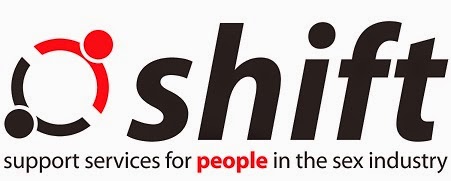At Shift, we don’t spend a whole lot of
time talking about human trafficking.
In 2014, we provided ongoing support and
case management to 125 registered program clients; only a handful of these
individuals had experienced trafficking.
In the 8 year history of Shift, people experiencing human trafficking
and other forms of sexual exploitation have remained a small minority of the
individuals we support.
Across Canada and the United States,
conversations about human trafficking have steadily grown in size and
scope. Many voices have added to these
conversations, but the voices of sex workers and sex worker organizations are
notably muted or absent. Human
trafficking is often conceptualized as being an issue separate from autonomous
sex work. Conversely, human trafficking
is also frequently conflated with sex work and incorrectly talked about as if
the two are the same. The result is an
overall climate where anti-trafficking efforts are broadly understood to be
anti-sex work, further limiting the voices of sex workers and their allies.
On a more localized level, conversations
about human trafficking are happening far more often than conversations about
sex work. In the wake of new
prostitution laws which greatly undermine the health and safety of thousands of
sex workers, the focus remains on a much smaller population of trafficked
individuals. Shift frequently responds
to, and participates in calls and invitations for trafficking-related research,
events, and information. As a sex worker
program with one of the largest client bases in the province, we do interact
with a number of those who have been identified in cases of trafficking and
other forms of sexual exploitation.
These cases have allowed us to build a strong and positive working
relationship with the local Action Coalition on Human Trafficking (ACT) to identify and support those who have
been trafficked. These cases have also
provided us with opportunities to share a different narrative in the
trafficking discourse, and to promote the importance of sex worker rights and
harm reduction as it relates to trafficking supports and prevention efforts.
In our experiences working with individuals
who have been trafficked, there are common themes and histories. Most have been white Canadian women, most
have experienced significant past traumas, and most were a sex worker before
they were trafficked. In broad terms,
the risk factors for these experiences of human trafficking were related to
substance abuse, criminalization, poverty, and trauma. These are not suburban housewives being
kidnapped and sold into sex slavery; these are sex workers on the margins being
targeted by traffickers for their vulnerability and isolation.
The experiences of trafficking we have seen
in our work at Shift do not fit with the popular discourse because they are
unpopular realities. They are connected
to larger, more contentious issues of sex worker rights and criminalization. Most often, the women we have worked with who
have escaped from their traffickers have exercised their choice and free will
to return to sex work, and very often to substance use. Timely access to safe, affordable,
harm-reduction housing has been the top need identified by those we have supported
after fleeing trafficking. This is also a
need that has been almost impossible for us to address. Existing emergency and transitional housing
programs do not provide the space to make decisions about sex work involvement
or readiness to address substance use issues.
Local harm reduction housing programs do exist, but the lengthy
application process and waiting times make this an unrealistic option for
someone fleeing an unsafe situation. The
unfortunate result of these gaps in services often means that we see
individuals return to unstable housing, substance use, and high-vulnerability
sex work – without the opportunity to engage in supports that will address the impacts
of the traumas they have experienced.
We cannot talk about preventing trafficking
without talking about how we support the rights and safety of those who choose
to be a part of the sex industry - whether this choice is made with full
autonomy or constrained by financial needs or other related factors. Harm reduction also needs to be significant
part of the trafficking conversation - in all areas of policy, prevention, and
support. Supporting those who have been
trafficked requires a significant amount of time and resources. This small number of people has a very high
level of urgency and needs. On a
National level, the prevalence and strength of the anti-trafficking movement
has contributed to a funding shift away from investing in sex worker support programs.
While they are often viewed as separate entities with different focus areas, these
organizations are working against trafficking every day by supporting the
rights and safety of sex workers, and by reducing risk factors for the most
vulnerable segments of the industry.
These are also the organizations that offer the most flexibility in
their support to those affected, allowing a space for people who have been
trafficked to reclaim their autonomy and name their needs.
Human trafficking is undeniably an atrocity
worthy of the empathy, compassion, and passion it attracts. The stories of abuse, control, and violence that
have been shared with us by those involved have left a powerful and lasting
impact. For anyone compelled to give
their voice, their time, or their money to fighting human trafficking – we have
a responsibility to ask ourselves what impact this work is having on the health
and safety of those who choose to be a part of the sex industry. Extreme anti-trafficking activism often risks
putting rescue before rights, advancing policies and laws which put all sex
workers at increased risk. Sex workers and their customers are one of the greatest resources and allies in preventing human trafficking; let us make space for their voices and actively include them
in the fight against trafficking. All
voices must be included and must be heard to support effective anti-trafficking
efforts and policies which aim to eliminate violence for all areas of the sex
industry.
